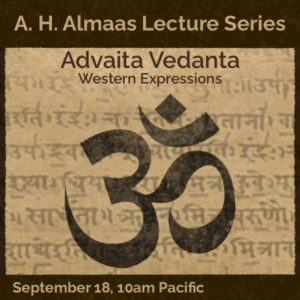
A.H. Almaas Lecture Series
Advaita Vedanta: Western Expressions
Date/Time: September 18, 10am-12:00pm Pacific
 The first texts of Advaita Vedanta, a nondual teaching of Hinduism, date to 500 CE. Through the ages, it has remained a powerful force in India. The great 20th-century teacher Ramana Maharshi employed Vedantic methods of inquiry into the nature of the self. His spiritual path centered on the question, “Who am I?”
The first texts of Advaita Vedanta, a nondual teaching of Hinduism, date to 500 CE. Through the ages, it has remained a powerful force in India. The great 20th-century teacher Ramana Maharshi employed Vedantic methods of inquiry into the nature of the self. His spiritual path centered on the question, “Who am I?”
Many streams of Advaita Vedanta came to the west from India. The teachings of Ramakrishna were brought to the west by Vivekananda. Maharishi Mahesh Yogi brought another lineage of both Vedanta and Advaita Vedanta westward. Some nondual teachers in the west trace their teachings back to Atmananda and his direct path. This transplanting of Indian spirituality onto new soil has led some people to wonder if something has been lost, or misconstrued, along the way.
In this lecture, Almaas will explore some of the most widely known Vedantic teachings of our times and situate them within their Indian origins, to help those interested in the rich tradition of Advaita Vedanta to understand what the classical teaching requires from students—something that is not often emphasized by Western teachers of nonduality.
The lecture will last approximately 75 minutes followed by a question and comment period.
About the Speaker
 A. Hameed Ali was born in Kuwait in 1944. At the age of eighteen, he moved to the US to study at the University of California in Berkeley. Hameed was working on his PhD in physics when he reached a turning point in his life and destiny that led him to inquire into the psychological and spiritual aspects of human nature rather than the physical nature of the universe. He left the academic world to pursue an in-depth journey of inner discovery, applying his scientific precision and discipline to personal, experiential research. This included study with different teachers in different modalities, extensive reading, and continuous study of his own consciousness in an effort to understand the essential nature of human experience and reality in general. Hameed’s process of exploration led to the creation of the Ridhwan School and, with Karen Johnson, resulted in the founding and unfoldment of the Diamond Approach. He is an author of over 19 different books.
A. Hameed Ali was born in Kuwait in 1944. At the age of eighteen, he moved to the US to study at the University of California in Berkeley. Hameed was working on his PhD in physics when he reached a turning point in his life and destiny that led him to inquire into the psychological and spiritual aspects of human nature rather than the physical nature of the universe. He left the academic world to pursue an in-depth journey of inner discovery, applying his scientific precision and discipline to personal, experiential research. This included study with different teachers in different modalities, extensive reading, and continuous study of his own consciousness in an effort to understand the essential nature of human experience and reality in general. Hameed’s process of exploration led to the creation of the Ridhwan School and, with Karen Johnson, resulted in the founding and unfoldment of the Diamond Approach. He is an author of over 19 different books. Registration Information
Lecture: Advaita Vedanta: Western Expressions
Date/Time: September 18, 10am-12:00pm Pacific
The A.H. Almaas Lecture Series was made possible by a generous donor.
If you would like to support free programs like this one, you can make a contribution here. Please write “A.H. Almaas Lecture Series” in the Notes section. The Ridhwan Foundation does not provide financial or tax advice. Please contact your financial advisor regarding tax deductions.
This lecture is one part of a six-part series. If you would like to explore similar programs, you can view the entire series.
Please direct all registration-related questions to the Ridhwan Foundation Communications Team at outreach@ridhwan.org.
Connect with us on social media! Follow us on Facebook and Instagram for all the latest information about the A.H. Almaas Lecture Series.

Privacy Policy | Terms & Conditions
© Copyright Diamond Approach, Ridhwan School – All rights reserved.